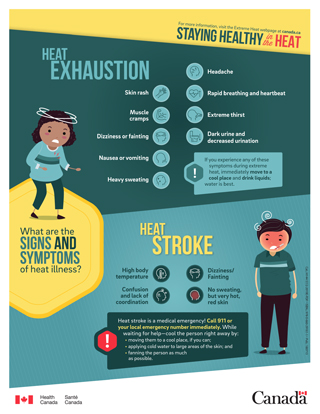Fact Sheet: Staying Healthy in the Heat

Download the alternative format
(PDF format, 474 KB, 3 pages)
Organization: Health Canada
Published: 2024
For more information, visit the Extreme Heat webpage at canada.ca
What are the signs and symptoms of heat illness?
Heat Exhaustion
- High body temperature
- Confusion and lack of coordination
- Skin rash
- Muscle cramps
- Dizziness or fainting
- Nausea or vomiting
- Heavy sweating
- Headache
- Rapid breathing and heartbeat
- Extreme thirst
- Dark urine and decreased urination
If you experience any of these symptoms during extreme heat, immediately move to a cool place and drink water.
Heat Stroke
- High body temperature
- Confusion and lack of coordination
- Dizziness/Fainting
- No sweating, but very hot, red skin
Heat stroke is a medical emergency! Call 911 or your local emergency number immediately. While waiting for help—cool the person right away by:
- moving them to a cool place, if you can;
- applying cold water to large areas of the skin; and
- fanning the person as much as possible.
Who is most at risk?
Fact 1 Older Adults
Older adults may be faced with compounding factors that could put them at increased risk during extreme heat events. These factors may include chronic illnesses, medications that interfere with the body's cooling mechanisms, social isolation, and poverty.
Fact 2 Infants and Young Children
Given the unique physiological characteristics of children's bodies and their high dependency on caregivers, they are likely to be at risk during extreme heat events.
Fact 3 Chronic Illness/ Special Medication
Individuals with breathing difficulties, heart problems, and psychiatric illnesses are at a higher risk of heat-related health effects.
Fact 4 People who Work or are Active Outdoors
People who work outdoors (e.g. construction, road repair) and physically active individuals who exercise in the heat could face greater environmental heat exposure and physical strain.
Safety Tips
Tip 1
Prepare for the Heat
- Tune in regularly to local weather forecasts and alerts so you know when to take extra care.
- If you have an air conditioner, make sure it works properly.
- If you don't have an air conditioner, find an air-conditioned spot close by where you can cool off for a few hours on very hot days.
Tip 2
Know the Signs of Heat-related illnesses
Tip 3
Pay Attention to how you and Those Around you Feel
Frequently visit neighbours, friends and older family members, especially those who are chronically ill, to make sure that they are cool and hydrated.
Tip 4
Drink Water
Tip 5
Stay Cool
How to stay cool
- Wear loose-fitting, light-coloured clothing made of breathable fabric.
- Take cool showers or baths until you feel refreshed.
- Plan strenuous outdoor activities for cooler days, or choose a cooler location, like a place with air conditioning or with tree shade.
- Spend time in a cool place. It could be a tree-shaded area, swimming facility or an air-conditioned spot.
Never leave children or pets alone in a parked vehicle.
For More Information
For more information or additional resources
- Visit the Extreme Heat webpage
- Visit the Health Canada heat health publications webpage
- Speak with your physician or personal care provider
- Contact your local public health authority